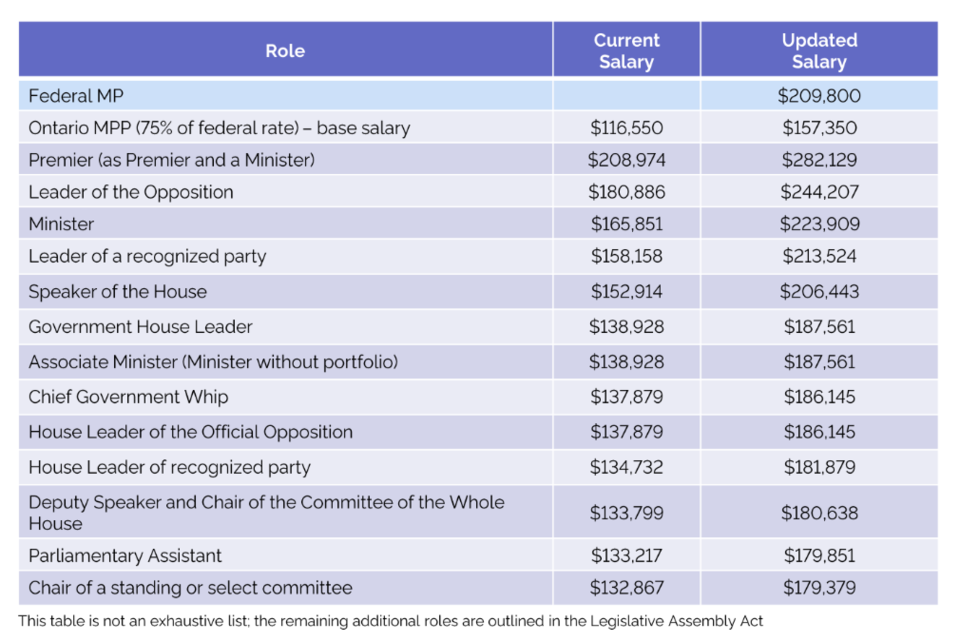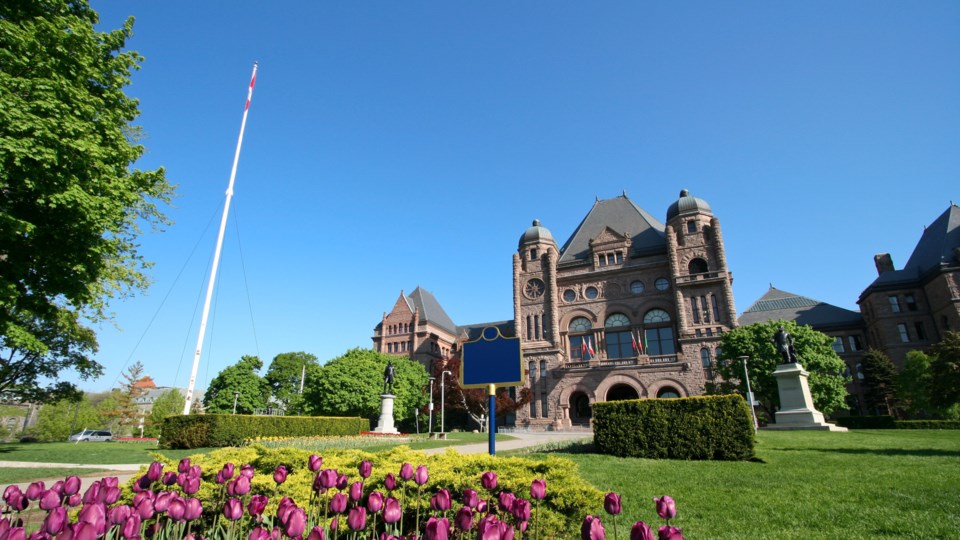Ontario political parties agree on two things on Thursday — ending an MPP salary freeze that’s been in place for 16 years and giving themselves a pension.
The government introduced new legislation that would raise the base salary for members of provincial parliament to $157,450 per year — an increase of $40,800 from their current pay — and implement a pension plan. It passed through the legislature with rare unanimous support on the same day.
Finance Minister Peter Bethlenfalvy — who was flanked by representatives from every political party, including Independent MPP Bobbi Ann Brady — said the pay raise is “fair and reasonable,” noting former Ontario integrity commissioner J. David Wake recommended removing the salary freeze as it could be contributing to a high level of MPP turnover.
“We’ve been feeling pressure,” Bethlenfalvy said. “We strongly believe this is a fair thing for the hard-working people who are public servants.”
Opposition house leader MPP John Vanthof noted the change is generational, and that people who decide to run for office often have to take “a huge pay cut” and, in many cases, give up their pension.
“We're not going to build the future of this province by excluding the people who have the qualifications and have the knowledge to move us forward,” Vanthof said before thanking the premier for “having the guts” to end the freeze.
The government notes that the new base salary is 75 per cent of the salary of a federal member of Parliament, a pay percentage MPPs would have been entitled to under the Legislative Assembly Act, if their pay had not been frozen since the late 2000s.
MPPs salaries will now increase in line with those of federal MPs, which uses a formula that accounts for inflation.
The government estimates the salary change could cost about $6 million in 2025-26. Officials stressed this would represent about 0.06 per cent of government spending on compensation for public services.
Salaries were first frozen by former Liberal premier Dalton McGuinty in 2009 during the global financial crisis. There has been resistance to reversing the change, with each successive government not wanting to be the one to pull the plug on the policy and give themselves a raise.
The move also comes after former MPP Lorenzo Berardinetti went public with his story of ending up living in a homeless shelter, prompting an outpouring of support and the impetus for change.
“That breaks your heart,” Bethlenfalvy said of Berardinetti’s lived experience. “They give up the pension, they give up an increase that they haven’t had in 16 years.”
Premier Doug Ford has used a loophole in recent years to bump up most PC MPPs’ pay. Since midway through his previous mandate, the vast majority of his caucus has been either in his cabinet or a parliamentary assistant, each of which comes with pay bumps.
Under the new legislation, the premier will get a $73,155 pay increase, bringing his salary to $282,129, while Ontario NDP Leader Marit Stiles will see her salary go up by $63,321.
Here’s a breakdown of the new salaries, which will go into effect retroactively as of Feb. 27, 2025:

New pension plan
The legislation will also replace the current retirement savings arrangement for MPPs with a new pension plan as of Jan. 1, 2026.
MPPs in Ontario haven’t received a pension since 1995, which was one of the reasons cited by former energy minister Todd Smith for his resignation from public service last year. Instead, the government takes 10 per cent of an MPP’s salary into a retirement account.
The new plan would be integrated with the Public Service Pension Plan (PSPP) — which covers most employees of the federal government — based on a three-year best average salary. The government says MPPs who have served for six years would “receive supplemental benefits,” although it’s unclear what those benefits will involve, with officials saying only that it would add “unique amendments” that would sit on top of the PSPP.
If an MPP serves less than six years, they would only receive the PSPP portion of the benefits.
MPPs will not be eligible to collect the pension until the end of the current legislative session. In the event that an MPP does not reach the end of the session, their pension contributions and nominal interest would be refunded.
The government said that federal rules prevent individuals over the age of 71 from accruing pension benefits, but that the provincial legislation would include “authority to provide an allowance to address existing MPPs and future MPPs who will be 71 years or older.”
Former MPPs aren’t eligible for the new pension plan.
The government said the cost of participating in the PSPP would be shared between MPPs and the government, and is estimated at about $2.3 million each in 2026-27, with the supplemental benefit paid by the government at a cost of about $4.4 million annually.
Note: This story has been updated to include minister comment.




